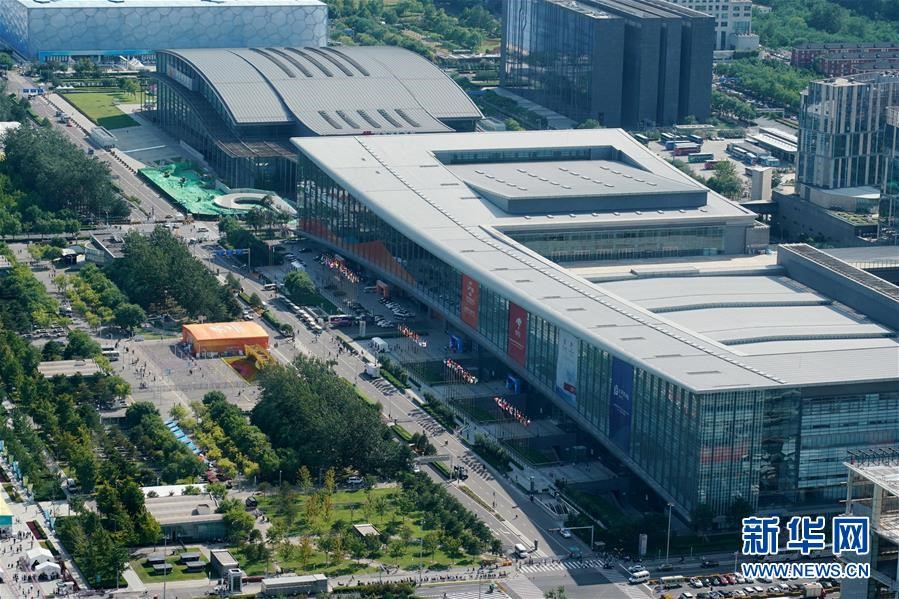China
International Fair for Trade in Services (CIFTIS), inaugurated in
2012, is one of the three major exhibitions for China's opening up.
Intended as a global brand of trade in services, it is now, after
eight years of development, a barometer of China's trade in
services and a bridge facilitating international high-level
cooperation in trade in services.

Under the theme of “Global Services, Shared Prosperity”, the 2020 CIFTIS came to an end on September 9. During the six days of the event, 190 forums and negotiations were staged on 200,000 square meters of exhibition space, with new policies and measures for opening up announced and business intentions and agreements nailed.
Carrying forward the historical missions and taking on new responsibilities, the CIFTIS would blaze a new trail for the opening up of China's services sector. With CIFTIS as a spearhead, Beijing would open a new chapter in China's opening up through its efforts to build a national comprehensive demonstration zone for greater openness in the services sector.
Bringing together multiple quality events, embarking on a new journey
In the exhibition hall of 5G communication services, new achievements of 5G development attracted large numbers of visitors with cloud gaming devices, AR concerts, and intelligent city management and operation platforms (e.g. for smart sanitation) as eye-openers for all.
With the rapid development of China's trade in services, the CIFTIS, jointly organized by the Ministry of Commerce and the People's Government of Beijing Municipality, would continue to grow into an even better high-level international event.
As the first major international economic and trade event held in China since the outbreak of COVID-19, the 2020 CIFTIS attracted wide attention.
—Bringing together several important exhibitions and events such as the China Beijing International Cultural Industry Expo, Beijing International Tourism Expo, World Winter Sports (Beijing) Expo, Beijing International Finance Expo, and World Robot Conference. Besides, the CIFTIS presented itself in a brand-new “1+8+N” model, i.e. one comprehensive exhibition area, eight thematic exhibitions and multiple functional service zones.
In
the thematic exhibition hall for tourism services, gorgeous scenery
was presented through cutting-edge technologies like digital
visualization and artificial intelligence. At the exhibition zone for
service robots, underwater robots, industrial drones, and various
high-tech products left visitors in awe for what science and
technology may bring.
—Altogether
190 forums and negotiations were held during the 2020 CIFTIS online
and offline.
Representatives
from 22,000 enterprises and organizations from 148 countries and
regions participated in the four summit forums on emerging trends in
the opening-up and development of trade in services and other topics
online or offline, sharing their opinions on new achievements and
trends in global trade in services.
According
to preliminary statistics, 97 authoritative documents were released,
19 alliances or platforms were established, and 99 innovations were
launched at the 2020 CIFTIS. Besides, provinces, autonomous regions
and municipalities, large enterprises directly under the central
government, and financial institutions all came to the event in
groups for the first time to negotiate for procurement contracts,
signing 240 agreements.
Wang Bingnan, Vice Minister of Commerce, pointed out that the 2020 CIFTIS demonstrated the effectiveness of China's epidemic control efforts and achievements in economic and social development, sending out positive signals reaffirming that China would continue to advocate economic globalization and strengthen international economic and trade cooperation.
Many international companies believed that the CIFTIS presented a more open Chinese market to the rest of the world. “The CIFTIS enables China's premium companies and services further onto the global market. This will promote the high-quality development of China's services sector and allow the world to share the dividends of China's opening-up,” said Yu Ying, Partner of Government and Public Sector Advisory, KPMG.
Coordinated development between “Made in China” and “Chinese Services”
In the hall for new achievement releases at the CIFTIS, events were held about every half an hour from 9:00 am. Some launched new products while others were signing ceremonies for various agreements. GE Healthcare presented its “Noah Fever Clinic Solution”, Price Waterhouse Coopers (PwC) released its research report Chinese Cities of Opportunity 2020, and Beyondsoft launched its SmartEdge product.
The CIFTIS is now a new stage for global merchants to find business opportunities and for enterprises to showcase their strengths.
Norman
Sze, Managing Partner of Northern Region of Deloitte China, expressed
Deloitte's willingness to find opportunities for innovation-driven
development at the CIFTIS. Sui Guodong, founder of Beijing Zhidemai
Technology Co., Ltd., said that his company was increasingly engaged
in the fair and that he felt the pulse of China's fast-growing
trade in services.
It
was the stable and positive development of China's trade in
services that instilled confidence into the exhibitors and experts at
the event.
In
fact, if the travel services industry, which suffered bitterly from
the COVID-19 pandemic, is excluded, China's import and export of
services grew by 2.1 percent in the first half of 2020, playing a
major role in keeping foreign trade stable and securing foreign
investment. Meanwhile, tourism is on its way to recovery.
“The Master Plan for the
Construction of Hainan Free Trade Port,
released in June, was a key step forward for the construction of the
free trade port with Chinese characteristics and has played a huge
role in revitalizing Hainan's tourism industry.” Liu Cheng,
Deputy Director General of Hainan Provincial Department of Tourism
Culture, Radio, Film, Television, Publication and Sports, said at
CIFTIS 2020, “In Hainan, tourism used to be the driver of
consumption, but now consumption also tends to drive tourism.”
“Against
the backdrop of the severe impact of the COVID-19, the resilience of
China's economy, the momentum of its services sector, and, in
particular, the high growth rate and high added value of trade in
services, have opened up ample room for trade growth in China.”
said Dong Yu, Executive Vice President of China Institute for
Development Planning at Tsinghua University, adding that China's
trade in services, transformed and upgraded, has a played its role in
keeping foreign trade and investment stable.
According
to Bai Ming, Deputy Director of the International Market Institute of
the Chinese Academy of International Trade and Economic Cooperation,
in developing trade in services, we should consider the
transformation and upgrading of China's manufacturing sector,
highlight the role of science and technology in services, and strive
to form positive interactions between industries, regions, and the
upstream and downstream sections of industry chains.
“'Made
in China' should advance hand in hand with 'Chinese services'
to create an open cooperation system featuring 'manufacturing +
services',” said Wang Qiang, Vice President of the University of
International Business and Economics.

China's opening-up brings opportunities to the world
In 2020, CITIC Prudential Fund Management Company had completed its registration, Oaktree Capital set up a wholly-owned subsidiary in Beijing; and Fitch (China) Bohua Credit Ratings Ltd. got the approval to start business operation. Despite the adverse impact of the COVID-19, the Chinese market remained highly attractive to the world as its services sector opened its arms.
“The
approval came earlier than we expected. The company has put in place
a sound organizational structure and operation has started smoothly.”
Chen Dongming, President of Fitch Bohua, a foreign rating company
approved to enter the Chinese market in May, said that Beijing's
policies for greater openness in the services sector had helped his
company get on track very quickly.
Since
the launch of the comprehensive pilot project for greater openness of
the services sector in Beijing in 2015, three different plans have
been proposed, and more than 120 reform measures have been launched
for greater openness of the services sector, investment and trade
facilitation, and a better business environment.
As
the pilot program expanded, the benefit it brings spread too. At the
2020 CIFTIS, China announced that Beijing would build a national
integrated demonstration zone for greater openness in the services
sector as the Plan for
Deepening the Comprehensive Pilot Program of a New Round of Expanding
Opening-up of the Services Sector in Beijing Municipality and
Building a National Comprehensive Demonstration Zone for Expanding
Opening-up of the Services Sector was approved by the State Council.
The plan sets out objectives for the next ten years and 26 specific
measures for greater openness of the services sector in Beijing.
According
to Chen Jining, Mayor of Beijing, based on the mutual reinforcement
of the domestic and international circulations, Beijing would adopt
more flexible models for opening-up such as “industry opening-up +
park opening-up”, try out negative list management of cross-border
trade in services, improve regulatory services, and increase tax
incentives for venture capital investment, technology transfer and
employment of foreign specialists, so that more and more long-term
mechanisms would be established for advancing the opening-up and
development of the services sector with less restrictions on foreign
investment.
“The
plan has quite a few highlights.” said Zheng Wei, Associate
Researcher at the China Outsourcing Institute. It aims to further
open up of the services sector in Beijing, and proposes to build a
national comprehensive demonstration zone. This would give full play
to the demonstration zone's function as a platform, accelerate the
clustering of the services sector, and bring economies of scale to
the efforts to further open up.
Tom
Simpson, Managing Director of China Operations of China Britain
Business Council (CBBC), stated that it is a highly positive signal
that Beijing would build a comprehensive demonstration zone, and he
also expressed CBBC's willingness to encourage more British
companies to come to China through cooperation and communication.
The
2020 CIFTIS had come to an end on September 9, but the online
platform powered by JD.com would continue to run as CIFTIS on the
cloud that would never draw its curtains.
“CIFTIS on the cloud maximizes cooperation opportunities for foreign companies and organizations.” said Joanna Liu, Executive Director of Euro-Sino Enterprises Association. China demonstrated its determination to open up further in all aspects. “We are pretty optimistic about China's development prospects and believe that a more open and inclusive China will contribute even more to the world economy.”


